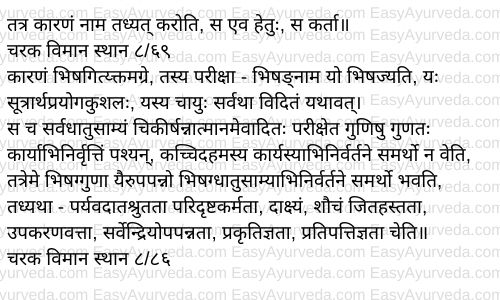Investigation Of Cause: Kaarana Pariksha
By Dr Raghuram Y.S. MD (Ay) & Dr Manasa, B.A.M.S
Ayurveda has emphasized on the cause and effect relationship in understanding all the events happening around us. Diseases are the effects and the etiological factors causing a disease are its causes.
Cause is also called Karana. It is the first factor to be examined among the tenfold investigation as explained by Master Charaka. In this context we are not discussing kaarana in terms of etiological factors for diseases. In fact kaarana here means ‘the doer or performer of action’.
Kaarana means the ‘cause of an action’.
It is something which is inevitable to initiate any action or task and is also mandatory for the accomplishment of a task.
Read – Karya Kaarana Bhava: Cause and Effect Relationship
Karana is of 3 kinds
Samavayi Karana – intimate causes
Asamavayi Kaarana – non-intimate causes
Nimitta Kaarana – instrumental causes

Table of Contents
Definition of kaarana
According to Master Charaka, Kaarana is defined as the doer of a task. The doer is also called by the names hetu and karta. Hetu also means reason and is a synonym of Kaarana.
Physician in terms of Kaarana – Kaarana means reason. The physician is the chief reason for achieving the effect i.e. karya. The effect of the treatment of a disease is achieving the equilibrium of dhatus, doshas and excreta in the body and thus establishing a state of health in the person. He is also the person who can achieve karyaphala i.e. benefits of treatment i.e. attainment of happiness / state of health and hence can be considered the cause for the same.
Physician in terms of Hetu – Hetu means ‘cause’ or a ‘reason’. It is the synonym of Kaarana. Therefore the meaning in terms of physician being hetu will also be the same.
Read – Trisutra of Ayurveda – Causes, Symptoms And Treatment
Physician in terms of Karta – Anyone who initiates an action immediately is called a Karta i.e. doer. The physician is the most important member among the 4 limbs of treatment. He is the person who initiates immediate action. Here the immediate action will be the commencement of appropriate treatment towards a diagnosed disease. Therefore he will be considered as the cause of all the action. All aspects of initiating, conducting and accomplishing a treatment (actions) is under control of the doer i.e. physician and he alone is capable to take those actions in the most needed way.
According to Master Chakrapani, the commentator of Charaka Samhita, Karta or doer is –
– the one who motivates other karanas
– the one who is associated with kartritva – i.e. having the capability of doing an action or owns the responsibility of doing an action
The success or failure of treatment totally depends on the physician. He should not only be capable of conducting them efficiently and in the proper way, he should also own the responsibility of those actions and their effects.
Read – Roga, Rogi Pareeksha: Examination Of Disease And Patient
Sanskrit Verses

Examination of Kaarana (physician, doer, cause)
One who does the treatment (action) is called a physician. Actually the physician should examine the patient. But in this context, the physician himself is the subject of examination i.e. the physician should be examined in this context, as kaarana.
Then who does the examination of the physician?
The physician should self-examine and self-access himself through self interrogation and self investigation. This is moreover like a self scan. The physician should self access if he is really competent enough to plunge into the action of conducting the treatment on the patients? Only if he is satisfied that he is capable enough and fulfils all criteria and qualities, should consider taking action i.e. planning and implementing the treatment to the patients.
Read – Eight Divine Qualities of a Physician – Ashta Jnana Devata
What points should be considered while examining a physician?
The person who has learnt and thoroughly understood the Ayurveda principles and knows how to implement them in the clinical practice is said to be a good physician. He also should know in detail about the Ayu. Such a wise physician who wishes to establish equilibrium of the body components and hence establish health in the patients, should first examine himself so as to ensure that he is good enough and ready for this job. The physician would be considered as good enough to treat patients if and only he is adorned with the below mentioned qualities. He or she shall examine these qualities in themselves as a part of self analysis. They are –
1. Paryavadaata shrutata – a complete and unadulterated knowledge of Ayurveda treatises
2. Paridrshta karmata – should have experience of having seen all procedures related to treatment (keen observance and learning)
3. Daakshyam – skilled enough to accomplish his job (doing treatment effectively)
4. Shoucham – clean by body, mind and senses
5. Jitahastata – mastery in doing treatment and getting success in the same
6. Upakaranavatta – well equipped with all medicines and instruments needed for clinical practice
7. Sarva indriya upapannata – all his senses should be intact
8. Prakrutighnata – should be expert in understanding, knowing and analyzing the constitution of the patient
9. Pratipattijgnata – capable of handling the complications arising while doing treatment
These are not just the qualities which need to be examined in a physician, but in fact reflect the responsibilities which a physician should take with wisdom and caution while in clinical practice.
Apart from these, the qualities of physicians have been enumerated by our masters every now and then in various contexts. Based on the qualities the physicians have also been given different designations and names. They too shall be considered in this context.
Read – 10 Factors Of Patient Examination – Dasha Vidha Atura Pareeksha
Kaarana in terms of Research
The physician is the cause or doer from the perspective of treatment. In medical research, the physician involved in research works is also a cause or doer and hence Karana.
Therefore from the perspective of research, kaaran or doer is the researcher. Any researcher can be a doer but since we are discussing medicine, the medical researcher may be considered as the doer in discussion.
Read – 11 Factors That An Ayurveda Doctor Considers To Decide On Treatment
Qualities needed by a researcher
1. Attitude
Research needs the below mentioned attitudes –
– curiosity to find out things
– courage to question prevalent beliefs and customs, to question the queries which have arisen due to curiosity
When one attempts to do research work with these attitudes, he or she shall be in a position to take necessary action needed for research.
2. Action to compliment the attitude
The research works by themselves are called actions. Taking action towards research too has 2 components –
– acquiring existing knowledge and training in the skills (physical and mental) needed to do the research related activities
– a strong determination to follow a plan with the performance
One would become a successful researcher or doer only when he has the above said qualities.
Master Charaka says that a physician should possess theory and practical clinical knowledge, should have the skill of making logical planning as per condition and person (yukti), should understand things in a comprehensive way and be insightful, an examiner, an administrator and intelligent. These are also the qualities of a researcher. The researcher should have inquisitiveness, interest, self motivation, commitment and critical scientific approach towards a subject. The qualities of a physician as explained by Master Charaka in the above said context can also be compared with the skills of a researcher.
Click to Consult Dr Raghuram Y.S. MD (Ayu)









